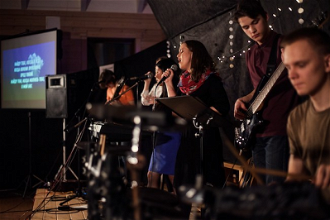Scottish Cardinal calls Trident weapons "immoral"

In an article in today's Times newspaper, Cardinal Keith O'Brien has described the Trident weapons system as a "weapon of mass destruction" and argue that possessing it is "morally reprehensible".
Scotland's Catholic Bishops issued a statement in April 2006 condemning the Trident system, scmo.org/articles/389/1/Bishops-statement-on-Trident/Page1.html their stance was subsequently endorsed by the Vatican, when Cardinal Renato Martino, President of the Pontifical Council for Justice and Peace, wrote to cardinal O'Brien endorsing the Bishops' April 2006 declaration.
In his article, the Cardinal states: "In any and all circumstances the use of a nuclear weapon would be immoral. Since, to use these weapons would be immoral, to threaten their use is immoral and to hold them with a view to threatening their use is also immoral."
Cardinal O'Brien adds: "We not only violate moral principles with our nuclear weapons but undermine our moral authority in the world." He concludes: "Rejecting Trident, not in 2024 but right now, will bring economic dividends at home and give moral leadership abroad. It would allow us, at last, to stand on the moral high ground and to invite the nuclear armed nations of the world to join us there."
A study guide to Nuclear weapons produced by the Justice & peace Commission of the Bishops' Conference of Scotland is available as a download here; www.justiceandpeacescotland.org.uk/downloads/replacing-trident.pdf
The full text of the Cardinal's article is shown below.
TRIDENT THE MORAL ARGUMENT
CARDINAL KEITH O'BRIEN
THE TIMES 29 JUNE 2009
A recent 'Times' Editorial on the Trident weapons system noting that "national defence is one of the cardinal duties of the statesman" caused me to reflect on the moral duties of a Cardinal.
In the current debate surrounding the replacement of Trident, we have heard a great deal in this newspaper and elsewhere about the financial, diplomatic, military and political arguments relevant to retention or rejection. By contrast we have heard precious little about the moral arguments involved. Sometimes the debate around a particular topic become so confused and nuanced that the moral considerations of any decision can be lost in the fog.
In the context of Trident renewal, the moral case is really quite simple. It cuts through and across any others. Because it is simple, let me put it simply. In any and all circumstances the use of a nuclear weapon would be immoral. Since, to use these weapons would be immoral, to threaten their use is immoral and to hold them with a view to threatening their use is also immoral.
We not only violate moral principles with our nuclear weapons but undermine our moral authority in the world. We were prepared to engage in a brutal war with Iraq to ensure that nation did not possess any weapons of mass destruction. We did this in the belief that possession of such weapons is morally reprehensible, which it is, unless of course we possess them. Our duality and moral hypocrisy on this matter fatally undermined our motivation in Iraq.
We must simply ask ourselves, 'are nuclear weapons useable?' The inherently indiscriminate and devastatingly powerful destructive force of a nuclear weapon makes it qualitatively different from any other type of ordnance. Their first use, under any circumstances whatsoever, would be immoral and a crime against God and humanity. Likewise, a counter-strike in retaliation would be just as immoral, even more so, because it would be motivated not by defence but by the hollow and hellish vengeance of the vanquished. It is perhaps no coincidence that one of the British Trident fleet is named HMS Vengeance.
In war a primary duty of the military is to protect the innocent and non-combatants. This foundational aspect of military conflict through the ages is brutally and utterly violated when a nuclear weapon is deployed.
Even a tactical deployment would constitute such a violation, yet Britain has no tactical nuclear weapons. Instead 200 identical warheads leased from the USA and quartered for the most part in Scottish waters comprise its strategic arsenal. Each one is eight times more powerful than the bomb, which devastated Hiroshima.
We all accept that threatening behaviour is a crime. In the domestic context it instils fear and mistrust and destroys relationships, so too in the international military context. To the Christian and to most people of faith threatening someone with such awesomely destructive power runs utterly counter to the call of God. A call to love, peace and
reconciliation, not destruction, domination and force.
I join this debate as a Christian Minister a Catholic Bishop and a human being who believes in the dignity and sanctity of human life. This pro-life message is at the heart of the Catholic Church and is one the Church champions, 'in season and out of season'. No one can uphold the teachings of Christ unless they speak out in defence of life, and the mass killing of innocent victims at any time and in any place.
Life, must mean life in all its fullness and at every stage, from conception to natural death, and any premature taking of life at any stage has deep moral implications. This is why the Catholic Church opposes abortion, is immersed in international development, stands against capital punishment, works to bring an end to the scandal of child soldiers, the trade in small arms, and so much more. It is why the Church has consistently opposed the development of nuclear weapons, and why it demands their abolition, now more than ever.
None of what I say comes from me alone, but rather from the highest moral authority in the Catholic Church; the Pope and the bishops working together and in Council. The last Council was Vatican II over 40 years ago, its teaching on this subject rings down through the decades: "Any act of war aimed indiscriminately at the destruction of entire cities or of extensive areas along with their population is a crime against God and man himself. It merits unequivocal and unhesitating condemnation."
This is moral teaching of the clearest kind, and my duty as bishop and Cardinal is to pass that teaching on. To act morally, to do the right thing, often takes courage, and sometimes means taking a stand that others do not agree with or accept. That is the test of leadership. Britain now has a golden opportunity to truly lead and to turn its back on the path of mass destruction.
In doing so we can assist others, particularly Russia and the USA who have shown much more willingness to be courageous than Britain has in recent months, but who have so much further to go to disarm than we do.
Rejecting Trident, not in 2024 but right now, will bring economic dividends at home and give moral leadership abroad. It would allow us, at last, to stand on the moral high ground and to invite the nuclear armed nations of the world to join us there.
Source: SCMO


















